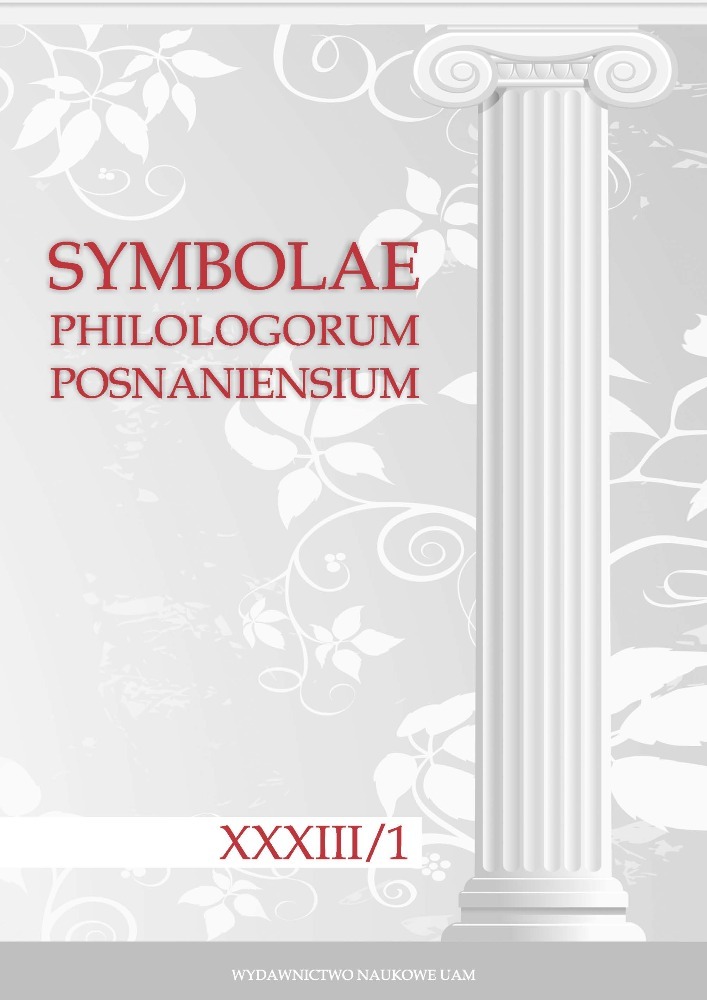Abstract
In the Neo-Latin poetry written from the fifteenth to the eighteenth centuries, one can find numerous references to the works of Ovid. The aim of this article is to reflect on the ways works by the famous Roman poet were received in Neo-Latin Christian literature of the Baroque period. The article discusses three poetry cycles inspired especially by Ovid`s elegies. Ovidius Christianus, whose author is the Jesuit Laurent Le Brun, refers to the Bible and informs about the New World in the form of poetic letters. Ovidius Christianus by Johannes Baptista Bebber presents in the form of elegies the moral principles of Thomas à Kempis contained in his work De imitatione Christi. The third item described is the booklet Novum liber tristium, which contains a series of seven elegies dedicated to the sorrows of Our Lady. The author of the article tries to show how the works of Ovid influenced the poetic imagination of Christian authors.
Literaturhinweise
J.B. Bebber, Ovidius Christianus sive B. Thomae a Kempis De Imitatatione Christi libri IV versu, quantum licuit, Ovidiano redditi, Coloniae Agrippinae 1734.
L. Le Brun, Virgilius Christianus, Parisiis 1661.
Novus liber tristium, acutissimo doloris stylo exaratus, Thorunii 1743.
Thomae Hemerken à Kempis, Opera omnia, vol. II, wyd. M.J. Pohl, Freiburg 1904.
Tomasz à Kempis, O naśladowaniu Chrystusa, przeł. A. Kamieńska, Warszawa 2008.
Bielak 2021: A. Bielak, The „Spiritual Hammer” (1656) As an Emblematic Translation of „Imitatio Christi” by Thomas à Kempis, „Central European Cultures” I (1956), nr 2, 29–58. DOI: https://doi.org/10.47075/CEC.2021-2.02
Budzisz 1995: A. Budzisz, Heroidy Heliusa Eobanusa Hessusa jako przykład renesansowej elegii religijnej, w: Elegia poprzez wieki, Poznań 1995, 117–130.
Danielewicz 1983: J. Danielewicz, Semantyczne funkcje form metrycznych w poezji antycznej, „Pamiętnik Literacki” LXXIV (1983), z. 1, 123–135.
Dörrie 1968: H. Dörrie, Der heroische Brief: Bestandsaufnahme, Geschichte, Kritik einer humanistisch-barocken Literaturgattung, Berlin 1968. DOI: https://doi.org/10.1515/9783110841893
Eickmeyer 2012: J. Eickmeyer, Der jesuitische Heroidenbrief: Zur Christianisierung und Kontextualisierung einer antiken Gattung in der Frühen Neuzeit, Berlin 2012. DOI: https://doi.org/10.1515/9783110260649
Eickmeyer 2014: J. Eickmeyer, Imitating Ovid to the Greater Glory of God, „Journal of Jesuit Studies” I (2014), z. 3, 419–442. DOI: https://doi.org/10.1163/22141332-00103004
Estreicher 1906: K. Estreicher, Bibliografia polska, t. XXI, Kraków 1906.
Habsburg 2011: M. von Habsburg, Catholic and Protestant Translations of the Imitatio Christi, 1425–1650: from Late Medieval Classic to Early Modern Bestseller, Farnham 2011.
Haskell 2014: Y. Haskell, The Passion(s) of Jesuit Latin, w: Brill Encyclopaedia of the Neo-Latin World, eds. P. Ford, J. Bloemendal, C. Fantazzi, Leiden, 775–790.
Hernas 1973: Cz. Hernas, Barok, Warszawa 1973.
Mazurkiewicz 2011: R. Mazurkiewicz, Z dawnej literatury maryjnej. Zarysy i zbliżenia, Kraków 2011.
Nassichuk 2018: J. Nassichuk, Biblical Elegy and Quattrocento Marian Encomium: Marcantonio Sabellico’s Carmina de Beata Virgine Maria, w: Biblical Women and the Arts (Biblical Reception 5), ed. D. Apostolos-Cappadona, London 2018, 143–158.
Nieznanowski 1989: S. Nieznanowski, Matka Boska w poezji baroku i czasów saskich, w: S. Nieznanowski, Studia i wizerunki, Warszawa 1989, 45–72.
O’Brien 2012: P. O’Brien, La Franciade de Le Brun. Poétique ovidienne de l’exil en Nouvelle-France, „Tangence” XCIX (2012), 35–60. DOI: https://doi.org/10.7202/1015112ar
O’Brien 2019: P. O’Brien, Si potes exemplo moveri, non propiore potes: Emotional Reciprocity in Laurent Le Brun’s Nova Gallia, w: Changing Hearts: Performing Jesuit Emotions between Europe, Asia, and the Americas, eds. R. Garrod, Y. Haskell, Leiden 2019, 147–166. DOI: https://doi.org/10.1163/9789004385191_008
Urban-Godziek 2005: G. Urban-Godziek, Elegia renesansowa. Przemiany gatunku w Polsce i w Europie, Kraków 2005.
Wheeler 2002: S. Wheeler, Introduction: Toward a Literary History of Ovid’s Reception in Antiquity, „Arethusa” XXXV (2002), nr 3, 341–347. DOI: https://doi.org/10.1353/are.2002.0028
Wheeler 2004: S. Wheeler, Before the ‘Aetas Ovidiana’: Mapping the Early Reception of Ovidian Elegy, „Hermathena” 177–178 (2004/2005), 9–26.


